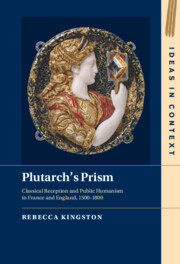Book contents
- Plutarch’s Prism
- Ideas in Context
- Plutarch’s Prism
- Copyright page
- Contents
- Figures
- Preface
- Acknowledgements
- Introduction
- Part I Setting the Stage
- Part II Plutarch in Renaissance France and England
- Chapter 3 Plutarch in Early French Renaissance Public Humanism: Geoffroy Tory and Guillaume Budé
- Chapter 4 Plutarch in Early French Renaissance Public Humanism: Desiderius Erasmus and Claude de Seyssel
- Chapter 5 Tudor Plutarch
- Chapter 6 Plutarch in Later French Humanism and Reformation: Georges de Selve, Jacques Amyot and Jean Bodin
- Chapter 7 Bernard de Girard Du Haillan and Michel de Montaigne on Thinking Through the Public Good in a Time of Civil Discord
- Part III Seventeenth- and Eighteenth-Century Plutarch
- Bibliography
- Index
Chapter 3 - Plutarch in Early French Renaissance Public Humanism: Geoffroy Tory and Guillaume Budé
from Part II - Plutarch in Renaissance France and England
Published online by Cambridge University Press: 22 September 2022
- Plutarch’s Prism
- Ideas in Context
- Plutarch’s Prism
- Copyright page
- Contents
- Figures
- Preface
- Acknowledgements
- Introduction
- Part I Setting the Stage
- Part II Plutarch in Renaissance France and England
- Chapter 3 Plutarch in Early French Renaissance Public Humanism: Geoffroy Tory and Guillaume Budé
- Chapter 4 Plutarch in Early French Renaissance Public Humanism: Desiderius Erasmus and Claude de Seyssel
- Chapter 5 Tudor Plutarch
- Chapter 6 Plutarch in Later French Humanism and Reformation: Georges de Selve, Jacques Amyot and Jean Bodin
- Chapter 7 Bernard de Girard Du Haillan and Michel de Montaigne on Thinking Through the Public Good in a Time of Civil Discord
- Part III Seventeenth- and Eighteenth-Century Plutarch
- Bibliography
- Index
Summary
Part II begins with Chapters 3 and 4 offering a study of the first printed vernacular translations of Plutarch’s work in French with special attention to political thought. After an initial discussion of the 1530 translation of Plutarch’s essay “Precepts of Statecraft” by the Royal Printer Geoffroy Tory (c. 1480–1533), a translation which invokes the French term of la chose publique in relation to Plutarch’s idea of politics, I explore Plutarch translations in the French context by scholars who went on to draft important treatises in political theory, namely Claude de Seyssel (1450–1520) and Guillaume Budé (1467–1540). I also explore some of Antoine du Saix’s (c. 1504–1579) translations of Erasmus’s (1466–1536) Latin translations of Plutarch’s Apophthegmata (or Sayings of Kings and Commanders), here shedding light on an important dialogue among these thinkers regarding the specific and unique nature of public life in reference to Plutarch’s work.
Keywords
- Type
- Chapter
- Information
- Plutarch's PrismClassical Reception and Public Humanism in France and England, 1500–1800, pp. 95 - 147Publisher: Cambridge University PressPrint publication year: 2022

